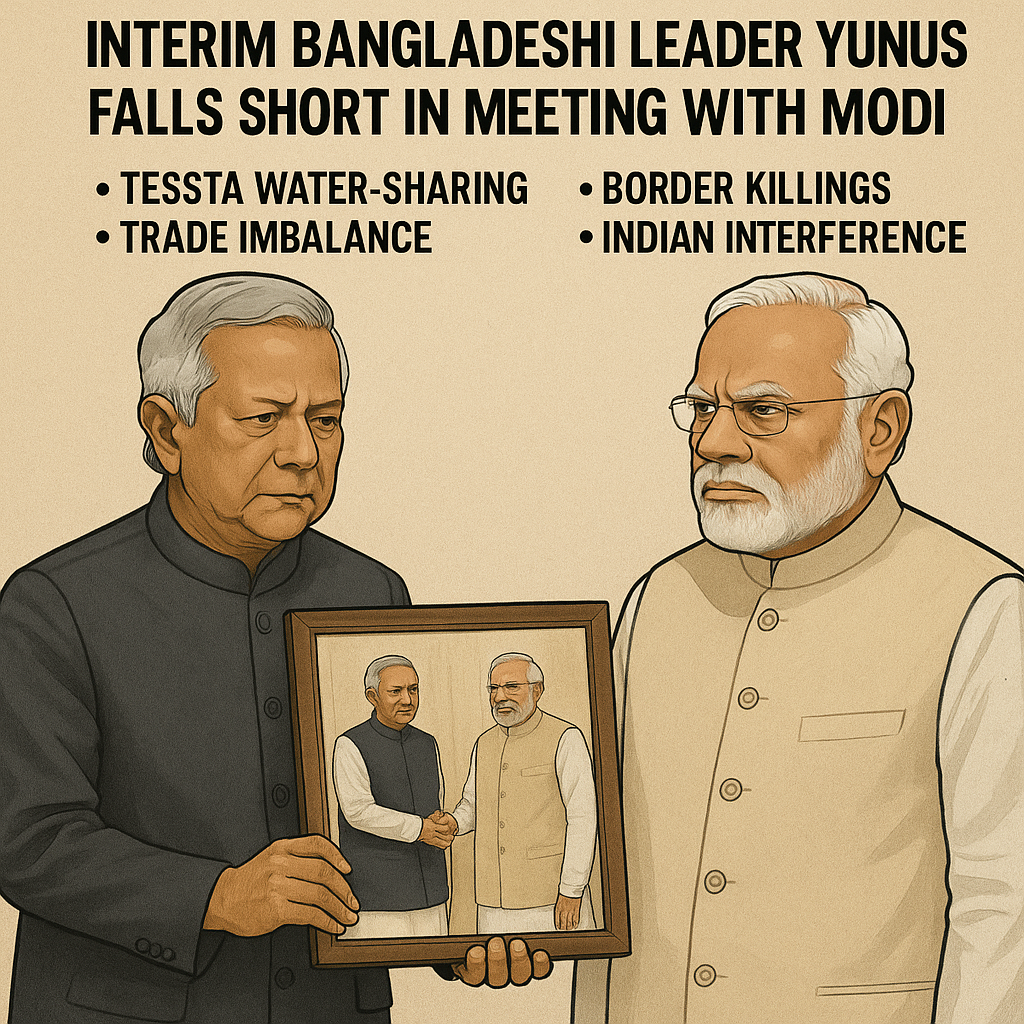
In what could have been a landmark moment to reset Bangladesh-India relations post-revolution, Interim Bangladeshi leader Dr. Muhammad Yunus fell short of expectations during his first bilateral meeting with Indian Prime Minister Narendra Modi. Held on the sidelines of the BIMSTEC summit in Bangkok, the meeting was marked more by symbolic gestures than substance—leaving many in Bangladesh wondering if Yunus is prioritizing optics over diplomacy.
A Historic Chance, Squandered
After the ouster of Prime Minister Sheikh Hasina in August 2024, Dr. Yunus took the helm amid sky-high public expectations. The nation hoped that his international stature would allow him to negotiate with India on critical issues that have long plagued the bilateral relationship. But instead of addressing the core grievances, Yunus presented Modi with a nostalgic photograph from 2015, when the two met at the Indian Science Congress (India Today).
Symbolism is fine, but what Bangladesh needed was diplomacy with purpose.
Key Issues Ignored
1. Teesta River Water-Sharing Agreement
Despite being a priority in Bangladesh’s foreign policy for over a decade, the long-pending Teesta water-sharing agreement wasn’t even mentioned publicly. The lack of any substantial discussion on this issue is glaring, especially as northern Bangladeshi farmers continue to suffer from inadequate water flow during the dry season.
2. Border Killings
Every year, Bangladeshi civilians are killed along the India-Bangladesh border, often by India’s Border Security Force (BSF). This is a deeply emotional and political issue for Bangladeshis, yet Yunus made no demand for accountability or even bilateral review mechanisms. His silence raises serious concerns about his willingness to defend national interests.
3. Trade Imbalance
The trade deficit with India remains a critical economic issue. In FY 2023–24, Bangladesh’s exports to India were less than $2 billion, while imports exceeded $14 billion (Export Promotion Bureau of Bangladesh). No indication was given that Yunus addressed this imbalance or advocated for market access for Bangladeshi goods.
4. Indian Interference in Domestic Affairs
Since Hasina’s departure, India has remained visibly cautious, but its historic influence over Bangladesh’s political trajectory is no secret. There was no mention of seeking a commitment from India to refrain from interference in Bangladesh’s electoral process.
Modi Took the Lead, Not Yunus
While Yunus remained mostly ceremonial, Modi set the agenda. The Indian PM brought up the protection of Hindu minorities in Bangladesh—a valid concern, but one that clearly shows India intends to continue playing a watchdog role in Bangladeshi domestic affairs. Modi also warned Yunus to avoid “rhetoric that vitiates the environment” (Hindustan Times)—a diplomatic slap in the face, subtly putting Bangladesh on the defensive.
A Leader Without a Political Base?
Dr. Yunus’s critics have long argued that his lack of political experience and grassroots connection make him ill-equipped to lead in a turbulent time. His performance in Bangkok may fuel those concerns. Rather than use this meeting to assert Bangladesh’s sovereign concerns, he appeared more focused on preserving his international image.
As the South China Morning Post noted, the meeting was more of a “cooling moment” than a diplomatic reset (SCMP)—a sign that Bangladesh may be retreating from assertive diplomacy under Yunus’s interim leadership.
Conclusion: Bangladesh Needs a Stronger Voice
The Yunus-Modi meeting was a symbolic gesture at best and a strategic misfire at worst. As Bangladesh moves toward elections, the people expect their leaders—temporary or not—to fiercely advocate for national interests. Diplomacy must go beyond gift exchanges and photo ops. It’s about standing firm on the issues that matter most to the people.
If Dr. Yunus hopes to leave a meaningful legacy, his next diplomatic engagements must reflect the will and concerns of the people he claims to represent.